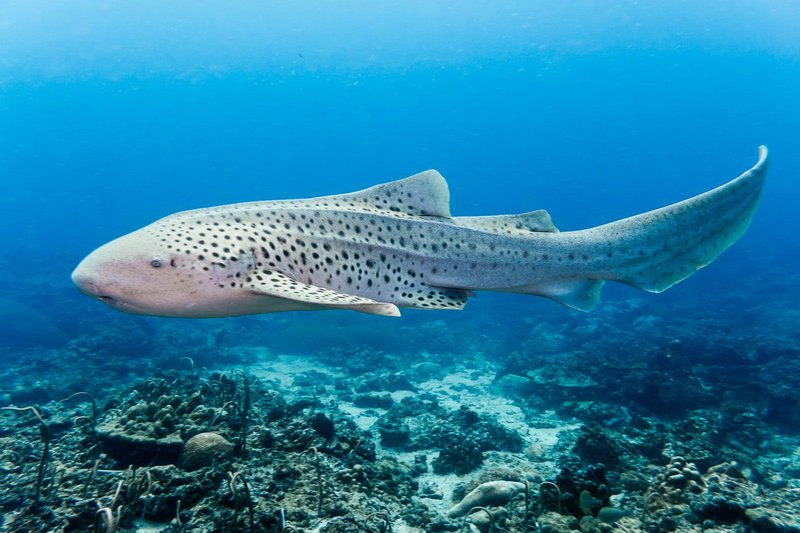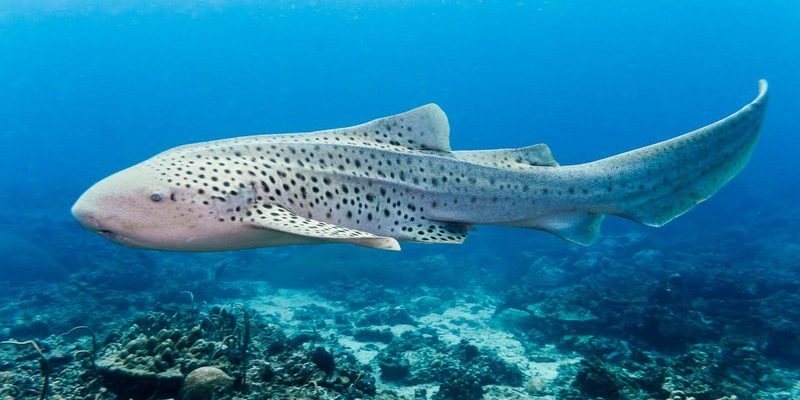
Let me explain it this way: picture a well-tended garden where every plant and creature has a job. You wouldn’t want any one part to go missing, right? Similarly, zebra sharks help create a vibrant underwater world that supports a plethora of other marine life. Throughout this article, we’ll dive deep into the zebra shark’s role in marine ecosystems, exploring their behaviors, habitats, and the challenges they face.
What Are Zebra Sharks?
Zebra sharks, known scientifically as *Stegostoma fasciatum*, are a type of carpet shark. They get their name from the bold, stripe patterns that resemble a zebra, especially when they are young. As they grow, they develop a more blotchy appearance, but their importance remains constant throughout their lives.
These sharks can typically be found resting on the ocean floor during the day, often in sandy or rocky environments. By night, they become more active hunters, preying on a variety of marine creatures like small fish and mollusks. This hunting behavior helps control the population of these species, ensuring that none become too dominant.
Besides their striking appearance, zebra sharks are known for their friendly demeanor. They’re often seen swimming alongside divers, showcasing their curious nature. If you’ve ever snorkeled near a reef, you might have been lucky to spot one gliding gracefully through the water.
The Ecosystem Services of Zebra Sharks
Zebra sharks provide several vital services within their marine environments. One of the primary ways they contribute is through their role as predators. By feeding on smaller fish and invertebrates, they help maintain population balance, preventing overpopulation of certain species that could otherwise wreak havoc on the ecosystem.
Moreover, their hunting habits encourage biodiversity, as different species strive to avoid becoming prey. This dynamic promotes a healthier reef community where a variety of organisms, from coral to fish, can thrive.
You might be wondering how this all fits together. Think of zebra sharks like custodians of the ocean floor. By keeping certain populations in check, they allow other marine life to flourish, creating a balanced and vibrant underwater garden. This balance is critical not only for the sharks themselves but for countless other species that share their habitat.
Zebra Sharks and Coral Reefs
Coral reefs are often considered the rainforests of the sea, teeming with vibrant life and complex ecosystems. Zebra sharks play a unique role in this environment as they help to keep the reef’s ecosystem in harmony. As they hunt, they contribute to the cycling of nutrients, which is vital for coral growth and health.
When zebra sharks feed on prey that graze on algae, they help control algae blooms that could otherwise choke out coral. If you’ve ever seen an overgrown garden, you know how much damage excessive growth can cause! In this sense, zebra sharks act as both predator and protector.
By maintaining healthy coral reefs, they provide a habitat for countless other marine lives, from colorful fish to intricate crustaceans. It’s a beautiful cycle—zebra sharks thrive on the reef, and in return, they support the very ecosystems that sustain them.
Threats to Zebra Sharks
Despite their importance, zebra sharks face several threats that jeopardize both their survival and the health of marine ecosystems. Overfishing is a significant concern, as these sharks are often caught for their meat or captured for aquarium trade. Unsustainable fishing practices can deplete their populations, disrupting the balance they help maintain in their habitats.
Additionally, habitat destruction poses a serious threat. Coastal development and pollution can adversely affect the environments where zebra sharks thrive. When mangroves and coral reefs are damaged, it’s not just the sharks that suffer; entire ecosystems can unravel, leading to a loss of biodiversity.
For example, when coral reefs are destroyed, the entire community of sea life that relies on them faces challenges—just like removing a vital plant from your garden would impact the whole ecosystem. Protecting zebra sharks is essential to preserving the intricate web of life in our oceans.
Conservation Efforts for Zebra Sharks
Thankfully, there are ongoing conservation efforts aimed at protecting zebra sharks and their habitats. Many regions have established marine protected areas where fishing is restricted, allowing zebra shark populations to recover and thrive. These areas serve as safe havens, where marine life can escape the pressures of human activity.
Organizations and researchers are also working to raise awareness about the importance of zebra sharks and the threats they face. Education initiatives can empower communities to practice sustainable fishing and protect marine environments.
Here’s the thing: if we want to enjoy the beauty of these gentle creatures, we must also champion their preservation. Supporting local and global conservation efforts can make a difference, ensuring future generations can witness the wonder of zebra sharks in their natural habitats.
The Future of Zebra Sharks and Marine Ecosystems
Looking ahead, the future of zebra sharks is closely tied to the health of our oceans. Their role as both predators and contributors to coral reef ecosystems underscores their importance. Protecting them means safeguarding the intricate balance of marine life that depends on their presence.
As more people become aware of the significance of these sharks, there’s hope for positive change. Sustainable practices in fishing, greater marine protection laws, and community engagement can help restore and maintain healthy habitats.
You might feel there’s not much you can do as an individual, but every little bit helps! Supporting sustainable seafood choices, participating in beach clean-ups, or advocating for marine conservation can all contribute to the ongoing effort to protect zebra sharks and their ecosystems.
In conclusion, the zebra shark is not just a stunning inhabitant of our oceans; it’s a vital player in the marine ecosystem. By understanding and respecting their role, we can help ensure that these magnificent creatures continue to thrive, maintaining the balance of life beneath the waves.

